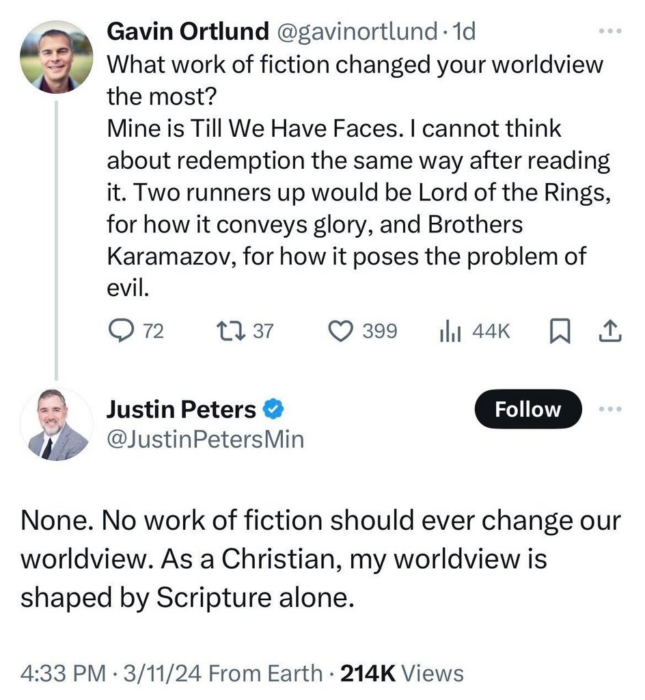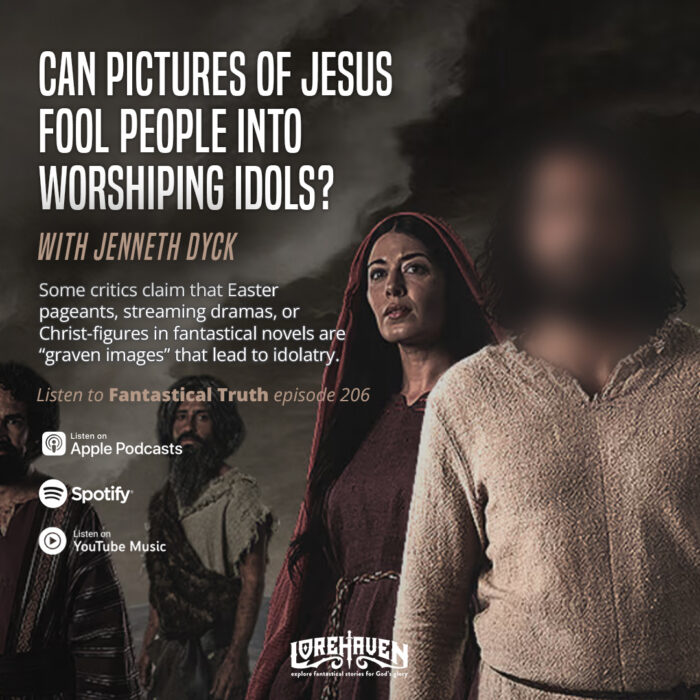207. Should We Get Mad When Christians Scorn Fantastical Fiction?
Podcast: Play in new window | Download (Duration: 1:17:04 — 71.9MB) | Embed
If you’re a Christian fantastical fan, you’re gonna have a bad time. That’s because some critics accuse you of special sin by liking that “entertainment” stuff. So when that popular religious leader, or that random comment, or even your own trusted family member or pastor, warns you against popular culture and fantastical stories, how should you respond in wisdom?
Episode sponsors
- Enclave Publishing: The Chaos Grid
- Changelings: Insurgence by Liam Corley
- Story Embers summit, May 23–25, 2024
Mission update
- NEWS: The Time Door by Shannon McDermott Opens For Pre-Orders
- Lorehaven reviews: last week, Mortal Queens; this week, Saints and Monsters
- Subscribe free to get updates and join the Lorehaven Guild
Concession stand
- We’ve spent previous episodes biblically defending fantastical fiction.
- And we explore the purpose of freedom for Christ’s and others’ sake.
- Now for some practical solutions: what do we do with Christian critics?
- Here’s a bigger disclaimer. Some of these criticisms can really hurt.
- For those who found refuge and Christ reflected in stories, it gets worse.
- The critic seems to be actively threatening a life raft Jesus threw to us.
- But if you feel a God-given surplus of ability to engage, do so joyously!
- We’ll refresh some of our rationale and offer tips on challenging them.
- But we’ll also share experiences of sorting good-faith from bad actors.
- Sometimes you must walk away from folks with different sorts of minds.
- The best you can hope for is that they’ll not persist in false accusations.
1. Ask why the critic is bothered about your choices.
- For example, pastors may be concerned about imagination’s real abuse.
- Or someone you know might see real negative side effects to fandom.
- All good things, even basic water and bread, can hurt us in some ways.
- So, if you know the person, it’s worth asking if there’s any merit there.
- Use your imagination. “If this person were right, what would it look like?”
- Otherwise, if your defense isn’t falsifiable, you may be over-defensive.
- In some cases, you may need simply to ignore the critic entirely.
- That’s likely of internet randos, many of whom get “perverse incentives.”
- They’re play-acting fantasies in their head of being imaginary “pastor.”
- In that case, they’re the ones abusing fantasy/imagination; avoid them.
- You won’t be able to crack the delusion that they’re Big Spiritual Boss.
- Instead, take heed of their twisted use of imagination, and be warned!
 2. Ask if the critic knows fiction is part of real life.
2. Ask if the critic knows fiction is part of real life.
- You’re on firm ground, especially if critics emphasize “the real world.”
- Easy response: “Indeed, and in the real world, people love fiction.”
- Everyone enjoys fiction of some kind, even passing hypotheticals.
- You needn’t even refer to Jesus’s parables; just point to basic living.
- And yes, even fantastical fiction is part of real life. Everyone knows this.
- Recent example: apologist Justin Peters in a fairly viral social reply.
- He insisted, “No work of fiction should ever change our worldview.”
- We’d ask what he means by that. What about illustrate our worldview?
- If the fiction points to Scripture, yes, it should! If not, no, it shouldn’t.
- But it’s silly to blame fiction in ways we wouldn’t blame pastors/teachers.
- This is a borderline “solo Scriptura” notion that Scripture doesn’t teach.
- For this, you need only point to the parables to defend good fiction.
- And it’s acceptable to point to your own testimony grounded in gospel.
- Yes, God has often used fantastic fiction (much by Christians) for good!
- Even many secular stories have common grace to reflect law/standards.
 3. Ask if critics understand the purpose of fiction.
3. Ask if critics understand the purpose of fiction.
- Here’s where you get to be a Vulcan while deconstructing that a little bit.
- Stephen likes to start with the question: What do you think fiction is for?
- Don’t assume the critic has done that work. He very likely has not.
- Of course, before you ask this, be sure you know good answers!
- Ask this: “Should I criticize only bad churches and ignore their purpose?”
- “If I did, you’d get the idea I only hate/ignore any church, good or bad.”
- “So why then is it acceptable only to criticize popular culture and art?”
- (For more about this hypothetical, see Stephen’s older article here.)
- Be aware that many critics can’t help think very mechanically about this.
- They have “a mind of metal and wheels” (Treebeard), practical to a fault.
- Stephen believes it’s best to stick with Scripture, especially in person.
- Many folks reflexively shut down with the Lewis and Tolkien quotes.
- So use these sparingly, and avoid rabbit-trails into fictional magic, etc.
- You also need to be able to say, with wide eyes and clear conscience:
“Fantastical stories do not tempt me to sin any more than usual. In fact, God has used many of these stories to make me love Jesus more.”
- Say it that boldly, especially in person, and folks have trouble accusing.
- Recognize that some Christians legit cannot fathom fiction’s purpose.
- It’s like they’re color-blind, able to see, but only in black-and-white.
- God has given these folks different gifts, and that is perfectly okay.
- Many hold to sola cerebra nonfiction as tightly as you hold to fiction.
- These folks find great comfort in systematizing, classification, and logic.
- Stephen and Zack relate—it’s partly why they’re often drawn to sci-fi!
- It’s helpful for both you and the critic to remember a key biblical truth.
- “The body is one and has many members,” all of which serve purpose.
- That’s the apostle Paul’s heartfelt/rational wisdom in 1 Cor. 12:12-27.
- Creative hearts cannot say to logical minds, “I have no need of you.”
- But even that’s an improvement over the false accusation of sin.
- That’s vital to shut down, not for our comfort, but Christ’s reputation.
Com station
Top question for listeners
- How have you felt when Christian leaders scorn fantastical fiction?
 Eustace in the Lorehaven Guild has thoughts on episode 206:
Eustace in the Lorehaven Guild has thoughts on episode 206:
Haven’t listened yet. First reaction: obviously as an Orthodox Christian I don’t have a problem with images of Jesus. But Second Commandment violations involve the creation of an image to embody what does not have a body. In the biblical context there was usually even a ritual where priests were ritually breathing life into the idols in a blasphemous inversion of the creation of man.
… It’s just weird to me. Even before I became Orthodox, it never occurred to me that the Second Commandment would have anything to do with pictures or statues (but especially pictures) of actual people, much less that a mental visualization of a real person would be an idol. I mean, idol worship is a very specific activity. You don’t accidentally do an idolatry by having an image inspire you to remember someone just a little too fondly.
Next on Fantastical Truth
Sixteen years ago next month, there was a Chronicles of Narnia: Prince Caspian movie. But guess what version Narnia steward Douglas Gresham praised was a better adaptation of his stepfather C. S. Lewis’s book? It is The Academy of Arts Logos Theatre’s Prince Caspian, running through April 2024 at The Museum of the Bible in Washington, D.C.! We invite Logos artisans into our studio to explore puppetry and performance for Christ’s glory.






































I don’t think I’ve met anyone that’s against the idea of stories and fantasy altogether. Most of my experience has been with more complex disagreements surrounding what KINDS of stories, music, etc. are good or bad. Everyone I know has slightly different viewpoints, and the conversations can be difficult, even among Christian friends that had stories as an important part of their lives from a young age. The same thing goes for conversations about fiction with secular people, but that’s actually been more painful, since lately those discussions have had political ramifications that impact more of society. Christians arguing about this can impact society too, but arguments with fellow Christians tend to be smaller and more personal…meaning that it’s easier to feel free from those arguments when not around the friends and family who have negative perceptions of stories.
Exactly how I respond to such conflicts depends on who I’m talking to, what the situation is, etc. In real life, I tend to know the people well enough to guage what to bring up and how. And/or I don’t bring up fiction story topics unless they’re relevant and described in a way that has the highest chance of being understood by whoever I’m talking to. Even in those cases, I don’t always name the story I’m referencing, that way the person can concentrate on the SCENARIO I’m describing from the story, and how it relates to the conversation. Then, they can see how deep the stories are, and what I am getting out of them, instead of only seeing the story and being so immediately overcome by something that offends them that they refuse to hear anything good about the tale.
This is not foolproof by any means, because people can still figure out what the story is, find something in it that bothers them, and have a strong reaction to it that clouds everything else out. But at least they would have seen some positive things beforehand which can, over time, help them see that maybe I’m coming from a good place when I choose to read the stories in question. I can keep coming back to the positive scene I described before and point out how they seemed to think my discussion of it was very deep. Even if they think I’m naively falling into something harmful, there’s still a part of them that would have to eventually acknowledge that maybe I’m not a bad person coming from a bad place, and that they can disagree with me and see me as ‘lost’, but also still caring and thoughtful or whatever. Being perceived in that manner is still frustrating, but at least it takes the worst side effects of these interactions away.